

What Is Medieval Poetry? (with pictures) Medieval Literature. Medieval Literature The Middle Ages saw the beginnings of a rebirth in literature.
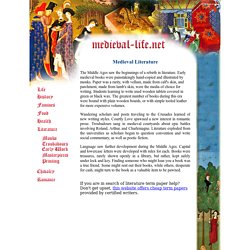
Early medieval books were painstakingly hand-copied and illustrated by monks. Paper was a rarity, with vellum, made from calf's skin, and parchment, made from lamb's skin, were the media of choice for writing. Students learning to write used wooden tablets covered in green or black wax. The greatest number of books during this era were bound with plain wooden boards, or with simple tooled leather for more expensive volumes. Medieval Literature. Facts and interesting information about Medieval Life,specifically, Medieval Literature Medieval Literature - The Dark Ages and the BardsEnglish Medieval literature had, so far as we know, no existence until Christian times of the Dark Ages when Latin was the language of English literature.
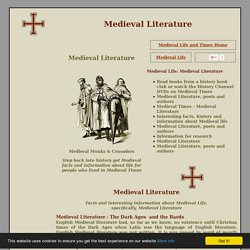
English Medieval literature was not written. It is was passed by word of mouth from one generation to another by English, Welsh and Irish bards. Popes in the Middle Ages. Written by Simon Newman History - Middle Ages Popes in the Middle Ages became central figures of power and influence.
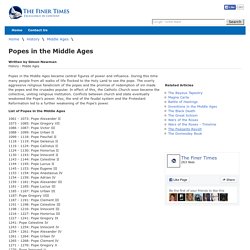
During this time many people from all walks of life flocked to the Holy Land to see the pope. The overly aggressive religious fanaticism of the popes and the promise of redemption of sin made the popes and the crusades popular. The Middle Ages - Popes vs. Kings. Popes vs.
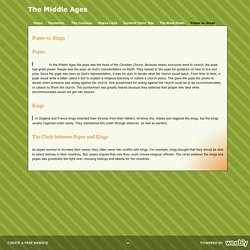
Kings Popes In the Middle Ages the pope was the head of the Christian Chruch. Because nearly everyone went to church, the pope had great power. People saw the pope as God's representative on Earth. Middle Ages, Dynamic Culture of the Middle Ages. The European High Middle Ages, which lasted from about 1050 to 1300, evoke for many people romantic images of knights in shining armor, magnificent castles, and glorious cathedrals.
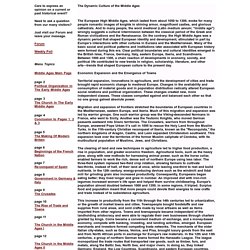
And to many people, the word medieval (Latin medium aevum; "middle age") wrongly suggests a cultural intermission between the classical period of the Greek and Roman civilizations and the Renaissance. On the contrary, the High Middle Ages was a dynamic period that shaped European identity and development, stimulated in part by Europe’s interactions with other cultures in Eurasia and the Mediterranean. Many of the basic social and political patterns and institutions later associated with European history were formed during this era. Clear political boundaries and cultural identities emerged in the British Isles, France, Germany, Italy, eastern Europe, Iberia, and Scandinavia.
Medieval History, Castles. MedievalPlus.com The Middle Ages is a period in European history which, along with its adjective ‘Medieval’, was first referred to by italian scholars and academics of the late fifteenth century.
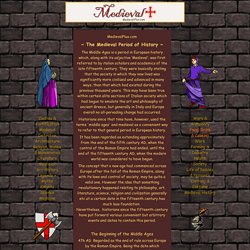
They were basically stating that the society in which they now lived was significantly more civilized and advanced in many ways, than that which had existed during the previous thousand years. This may have been true within certain elite sections of Italian society which had begun to emulate the art and philosophy of ancient Greece, but generally in Italy and Europe overall no all-pervading change had occurred. Becket Murder. Thomas Becket murdered at Canterbury Canterbury, 29 December 1170 Thomas Becket, the archbishop of Canterbury, was struck down by swords in the north transept of his own cathedral today as he stood by the altar of the Virgin Mary.
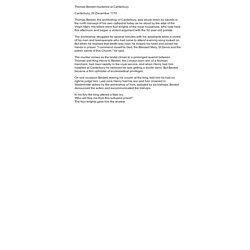
His killers were four knights of the royal household, who rode here this afternoon and began a violent argument with the 52-year-old prelate. The archbishop struggled for several minutes with his assailants while a crowd of his men and townspeople who had come to attend evening song looked on. The Murder of Thomas Becket, 1170. The Murder of Thomas Becket, 1170 A sword's crushing blow extinguished the life of Thomas Becket, Archbishop of Canterbury, on a cold December evening as he struggled on the steps of his altar.
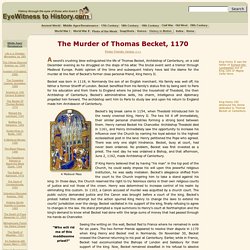
The brutal event sent a tremor through Medieval Europe. Public opinion of the time and subsequent history have laid the blame for the murder at the feet of Becket's former close personal friend, King Henry II. Becket was born in 1118, in Normandy the son of an English merchant. His family was well off, his father a former Sheriff of London.
The Canterbury Tales. Looking back, it’s difficult to remember just when the idea came to create The Canterbury Tales, but it must have been around 1387.
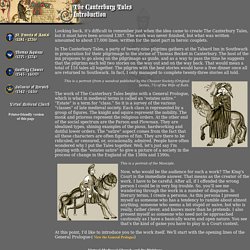
The work was never finished, but what was written amounted to about 17,000 lines, written for the most part in heroic couplets. In The Canterbury Tales, a party of twenty-nine pilgrims gathers at the Tabard Inn in Southwark in preparation for their pilgrimage to the shrine of Thomas Becket in Canterbury. The host of the inn proposes to go along on the pilgrimage as guide, and as a way to pass the time he suggests that the pilgrims each tell two stories on the way out and on the way back.
St. Thomas Becket - Archbishop, Saint. Geoffrey Chaucer. Geoffrey Chaucer (c.1343-1400) Welcome to the Luminarium Chaucer page.
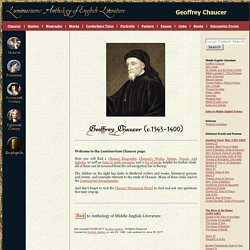
Here you will find a Chaucer Biography, Chaucer's Works, Quotes, Essays and Articles, as well as links to study resources and a list of books helpful for further study. All of these can be accessed from the red navigation bar at the top. The sidebar on the right has links to Medieval writers and works, historical persons and events, and concepts relevant to the study of Chaucer. Geoffrey Chaucer. Geoffrey Chaucer was born in London sometime between 1340 and 1344 to John Chaucer and Agnes Copton. John Chaucer was an affluent wine merchant and deputy to the king’s butler. Through his father’s connections, Geoffrey held several positions early in his life, serving as a noblewoman’s page, a courtier, a diplomat, a civil servant, and a collector of scrap metal. His early life and education were not strictly documented although it can be surmised from his works that he could read French, Latin, and Italian.
History - Geoffrey Chaucer. Geoffrey Chaucer - Author, Poet. English poet Geoffrey Chaucer wrote the unfinished work, The Canterbury Tales. It is considered one of the greatest poetic works in English. Synopsis.